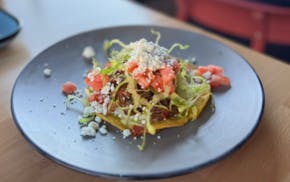Whether you're growing your own, buying them at a farmers market or finding the ones "locally grown" at your favorite grocery store, tomatoes are now at their ripest, which makes them just right for a big batch of fresh tomato sauce.
Making a fresh tomato sauce that truly captures everything we love in a tomato can be a difficult task. It often turns out watery and lacking in flavor.
It's no wonder. Tomatoes contain a lot of water which can, in a sauce, dilute the intensity. Getting rid of that water, though, comes with a price.
You could cut up the tomatoes and strain out some of the liquid, but that liquid, as loose as it is, has a lovely tomatoey flavor that would be a shame to waste. Reducing all that extra liquid in the cooking process can take away the freshness that comes from not cooking or barely cooking the fresh tomatoes.
This week's recipe, Buttered Fresh Tomato Sauce, takes an approach that addresses both issues.
It starts with choosing the right tomatoes. I like a combination of a paste tomato, like Romas or plum, and heirloom tomatoes. Using a variety of tomatoes gives the sauce a balanced flavor and hearty texture. Both kinds are easily found in most grocery stores this time of year, but if heirlooms are difficult to find, choose a ripe beefsteak instead.
For this sauce, the tomatoes are puréed. A portion of the purée is set aside, and the remainder is cooked down to a thick sauce. The reserved fresh tomato purée is added back at the end of process, giving the sauce the bright flavor that comes with uncooked tomatoes.
Using butter instead of olive oil is a nod to the great Italian cookbook author Marcella Hazan, who taught us that a healthy dose of butter can make a good tomato sauce better, adding richness and a velvety texture.
Because every tomato is different in terms of acidity and sweetness, you may want to make some last-minute adjustments at the end of the cooking process. A teaspoon or two of sugar or a few drops of lemon juice can bring a sauce that isn't quite right into perfect focus.
If you have mountains of fresh tomatoes on your hands, feel free to double this recipe, although you will likely need to adjust the cooking time, as you're reducing the tomato sauce.
I use this sauce on pasta, pizza, as a base for burrata or fresh mozzarella, over meatballs or simply as a dip for a crusty loaf of bread.
It also freezes beautifully, ensuring you'll have the bright taste of summer during even the darkest of winters.
Buttered Fresh Tomato Sauce
Makes about 5 cups.
Note: Take advantage of summer's perfectly ripe tomatoes with this fresh sauce. The addition of butter gives the sauce a rich taste and velvety texture. A touch of sugar or a few drops of lemon juice can be added at the end of the cooking process to get the flavor just right if your tomatoes lean on the acidic or sweet side. From Meredith Deeds.
- 2 ½ lb. ripe heirloom tomatoes, cored
- 2 ½ lb. Roma or other paste tomatoes
- ¼ c. (4 tbsp.) butter, divided
- 2 tbsp. tomato paste
- 2 cloves garlic, minced
- ¼ tsp. red pepper flakes
- ¾ tsp. salt
- 2 sprigs basil
Directions
Cut tomatoes into 2-inch pieces. Working in 2 or 3 batches, process tomatoes in a blender or food processor until puréed; it doesn't have to be perfectly smooth. (You should have 8 to 9 cups of tomato purée.) Set aside 1 cup of the purée to add at the end.
Heat 2 tablespoons butter in large Dutch oven over medium heat until shimmering. Add tomato paste and cook, stirring, for 2 to 3 minutes, or until the paste turns a rusty color. Add the garlic and pepper flakes and cook until fragrant, about 1 minute. Stir in tomato purée, salt and basil sprigs. Increase heat to medium-high and bring to simmer. Reduce heat to medium-low and simmer for 40 to 50 minutes, until the sauce has reduced by almost half, stirring occasionally, to produce about 4 cups medium-thick sauce.
Remove pot from heat and add the reserved 1 cup tomato purée and remaining 2 tablespoons butter. Taste and adjust the seasoning if necessary (see Note). Use immediately or let cool completely before refrigerating or freezing. Sauce can be refrigerated for up to 1 week or frozen for up to 3 months.
Meredith Deeds is a cookbook author and food writer from Edina. Reach her at meredithdeeds@gmail.com. Follow her on Instagram at @meredithdeeds.

What we lose when chain drugstores replace family-owned independents
![George Floyd's daughter Gianna Floyd, 6, looks to her mother Roxie Washington during a press conference at Minneapolis City Hall. ] LEILA NAVIDI •](https://arc.stimg.co/startribunemedia/WSDMNXVK3VZJDLDP3BTMCSMXNU.jpg?h=91&w=145&fit=crop&bg=999&crop=faces)
Medcalf: Hateful comments made after recent column on George Floyd's daughter left me discouraged

John Cusack dishes on 'High Fidelity' at Minneapolis screening

For 'Legally Blonde' star, 'being underestimated is her secret superpower'
